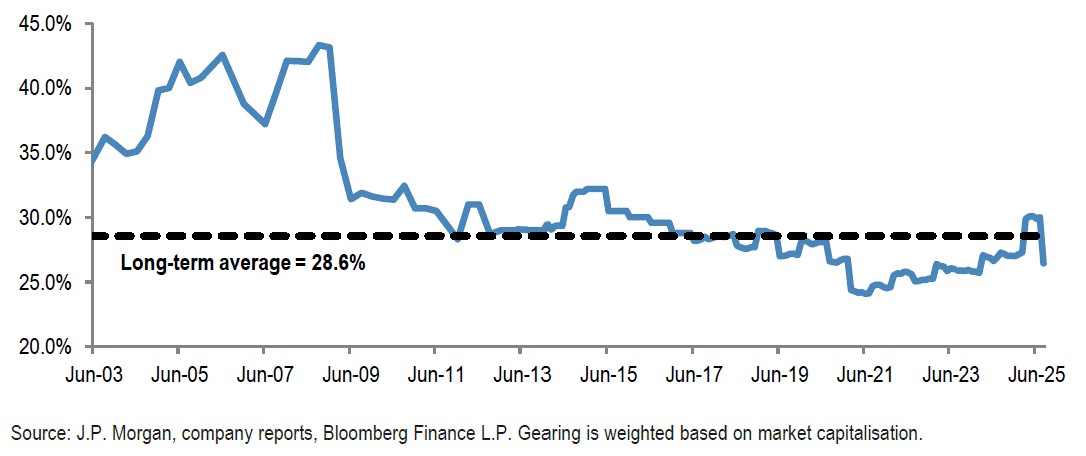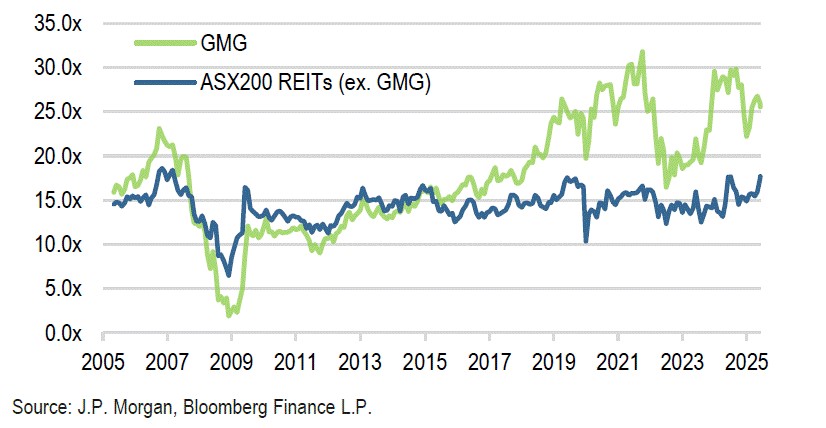
33 Alfred Street has been reinvented as a dynamic, future‑ready landmark in Sydney CBD's financial core. Its renewal blends preserved harbour views and heritage character with modern workplaces, transforming the tower into a high‑performing asset.
Welcome to "Corporate"
You are now viewing the main section of our website.
To switch to Leasing or Investing, use the menu above.

When a business fails, it is usually due to excessive debt. In the 2008 financial crisis, this was a lesson the AREIT sector learned the hard way. At the time, average AREIT gearing was above 40%. For a supposedly conservatively managed investment designed to deliver stable regular dividends, the figure was too high.
Change was forced uponerrant management teams. The sector responded appropriately, largely because it had little choice.
This has been to the great benefit of AREIT investors and Covid offered the proof. Having lowered average sector gearing to 29% prior to Covid—falling to 26% by June 2025—AREITs survived the trickiest environment since the financial crisis.
Chart 1: AREIT gearing 2003-2025

It is also true to say that they hardly prospered. That is now changing. AREITs currently offer an opportunity to income-based investors willing to reconsider the sector. I’d like to explain why.
Emerging from COVID, interest rates increased rapidly. This inhibited the recovery and capped growth. With interest rates falling, the cost of debt, which had been a headwind over the past few years, is now a tailwind that delivers the whiff of opportunity.
As active managers, interest rates are closely monitored by the team. Over the next two to three years, we expect AREIT earnings growth to be markedly stronger as rates continue to fall. This is yet to be fully incorporated in share prices, making AREITs a compelling investment proposition.
This, however, isn’t true of every AREIT. As Chart 2 shows, the improving outlook has already seen considerable share price outperformance from large-cap fund managers like Goodman Group and Charter Hall.
Chart 2: Goodman Group (GMG) vs ASX 200 AREIT ex GMG

The performances of these giants skews the index. Whilst the sector remains fairly valued on earnings and asset value metrics, once the two biggest AREITs by market capitalisation are excluded, the average multiple of the remaining stocks, on a price-to-earnings ratio of around 16, looks more reasonable. The gap between the blue and green lines in the chart above makes the distinction clear.
In addition, this average multiple doesn’t incorporate the prospect of higher earnings growth. In some cases, this makes current valuations even more compelling.
So, where can conservative income inventors best find respectable yields and capital growth without undue risk?
Active management is about identifying value and balancing risk and potential reward. At Dexus AREIT Fund, we don’t invest in anything without a bullet-proof balance sheet and clear earnings growth. Here are two of the Fund's top picks that meet these stringent criteria.
Stockland Group (ASX:SGP) is Australia’s leading diversified property group with a portfolio spanning residential communities, retail town centres, logistics hubs, workplace assets and over-50s land-lease communities.
It is an under-appreciated fact that over half of the company’s net income comes from residential communities. Recent interest rate cuts and government incentives—particularly first home buyer grants—have reignited the path to home ownership.
We expect Stockland to capitalise on the rebound because it has been busy preparing for it. Australia’s persistent housing undersupply has made it a focal point for investors, provoking interest from domestic and international capital seeking sector exposure.
Two years ago, Stockland established a capital partnership to co-invest in development projects. This enables the company to fund its residential, industrial and retail development pipeline without overburdening its balance sheet. It’s a good example of Stockland’s experienced and well-respected management team planning for the future while managing risk.
With a clear growth roadmap, the company is set to deliver consistently high single-digit earnings growth over the next three years. At a valuation of 17 times earnings, Stockland offers compelling value and remains one of the Fund’s high-conviction picks.
Our next pick is Region Group (ASX:RGN), an internally-managed AREIT that owns and operates 87 grocery-anchored convenience retail shopping centres across Australia.
Retail REITs are a resilient and attractive asset class supported by steady consumer spending, high occupancy rates, and limited new supply. Along with capitalisation rate compression, these fundamentals have driven positive leasing spreads and rent growth across the sector.
Understandably, many retail AREITs have registered notable share price gains as a result. Region Group, however, despite the income stability of its underlying portfolio, has lagged. Supported by lower costs and revenue growth, we expect the company to close this performance gap.
The data is encouraging. At 3.3%, supermarket sales remain resilient while rent review increases of 4.3% among specialty tenants are boosting revenues. Region Group’s portfolio is also being carefully re-positioned to drive growth and reduce costs.
Management gets a big tick for keeping gearing in the low 30% range at a time when revaluations are rising. As for the portfolio’s cap rate, it sits at a prudent 6% while recent market transactions have occurred in the mid 5% range—highlighting further cap rate tightening.
This is a valuable reference for Region’s portfolio, reinforcing the credibility of its asset base and capital position. The recent appointment of Greg Chubb as CEO—a highly regarded figure in retail property—should deliver an even more active, performance-driven approach.
With a valuation at around 15 times earnings—well below the sector average—Region Group is set to benefit from higher net operating income, asset revaluations and new leadership.
Together with Stockland Group, it’s a perfect example of the benefits of active management in income investing.
Important note: This document (“Material”) has been prepared by Dexus Asset Management Limited (ACN 080 674 479, AFSL No. 237500) (“DXAM”). DXAM is a wholly owned subsidiary of Dexus (ASX: DXS). Information in this Material is current as at March 2025 (unless otherwise indicated), is for general information purposes only, does not constitute financial product advice, has been prepared without taking account of the recipient’s objectives, financial situation and needs, and does not purport to contain all information necessary for making an investment decision. Accordingly, and before you receive any financial service from us (including deciding to acquire or to continue to hold a product in any fund mentioned in this Material), or act on this Material, investors should obtain and consider the relevant product disclosure statement (“PDS”), DXAM financial services guide (“FSG”) and relevant target market determination (“TMD”) in full, consider the appropriateness of this Material having regard to your own objectives, financial situation and needs and seek independent legal, tax and financial advice. The PDS, FSG and TMD (hard copy or electronic copy) are available from DXAM, Level 5, 80 Collins Street (South Tower), Melbourne VIC 3000, by visiting https://www.dexus.com/investor-centre, by emailing investorservices@dexus.com or by phoning 1300 374 029. The PDS contains important information about risks, costs and fees (including fees payable to DXAM for managing the fund). Any investment is subject to investment risk, including possible delays in repayment and loss of income and principal invested, and there is no guarantee on the performance of the fund or the return of any capital. This Material is not intended for distribution or use in any jurisdiction where it would be contrary to applicable laws, regulations or directives. Any forward looking statements, opinions and estimates (including statements of intent) in this Material are based on estimates and assumptions related to future business, economic, market, political, social and other conditions that are inherently subject to significant uncertainties, risks and contingencies, and the assumptions may change at any time without notice. Actual results may differ materially from those predicted or implied by any forward looking statements for a range of reasons. Past performance is not a reliable indicator of future performance. The forward looking statements only speak as at the date of this Material, and except as required by law, DXAM disclaims any duty to update them to reflect new developments. Except as required by law, no representation, assurance, guarantee or warranty, express or implied, is made as to the fairness, authenticity, validity, suitability, reliability, accuracy, completeness or correctness of any information, statement, estimate or opinion, or as to the reasonableness of any assumption, in this Material.
Connect with us to explore investment opportunities, find the right space for your best work or learn more about what we do. Together, let’s create tomorrow.